 BBC News
BBC NewsBorrowing was £17.4bn last month, the second highest October figure since monthly records began in 1993.
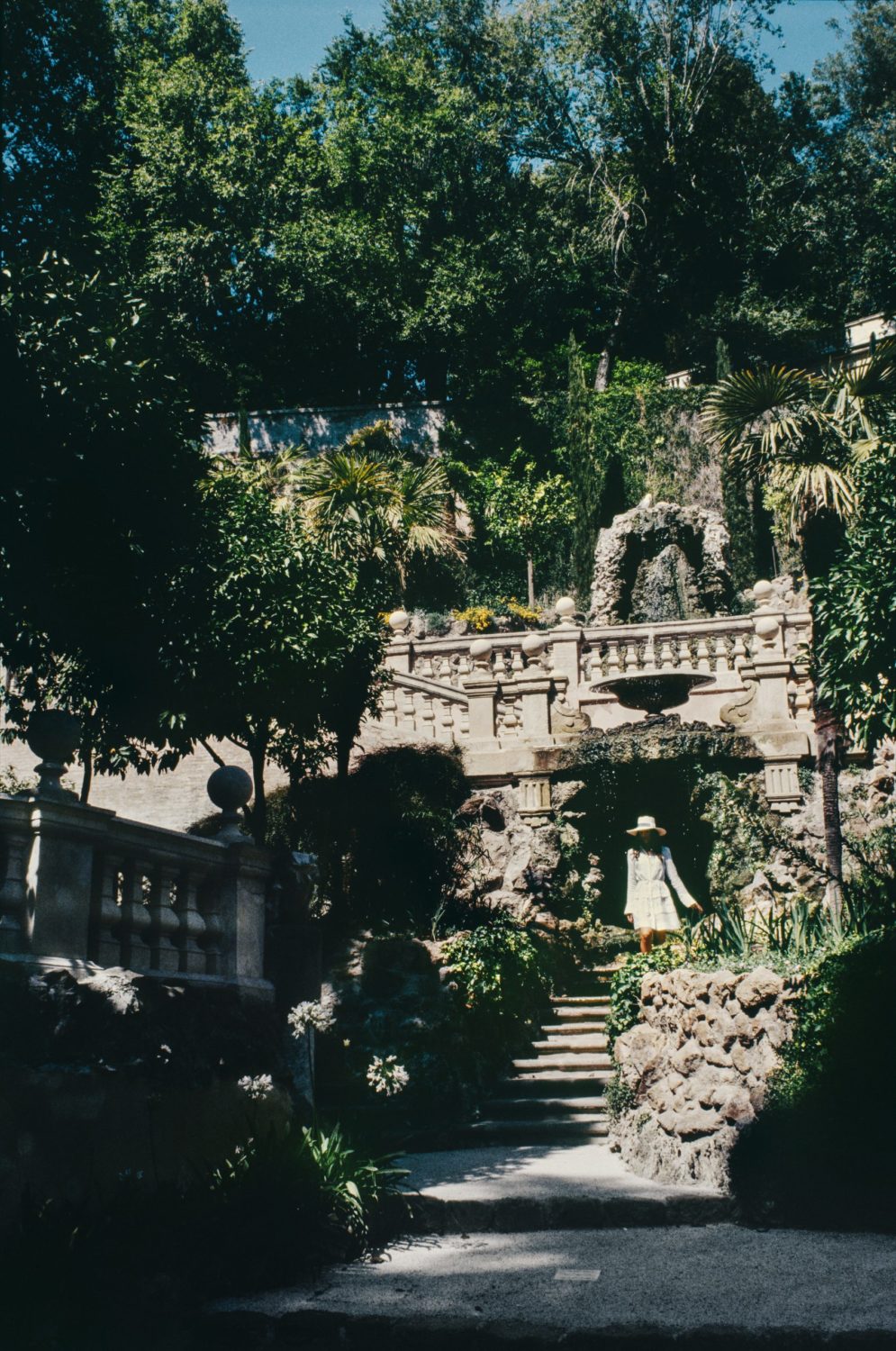
George Achebe
It is an aspect of the absurdity unleashed by the pandemic that work sectors experienced contraction, stability, or even expansion, according to their relationship to human touch and proximity. It is as if someone had madly gone through society punishing only people over six feet six, or those with red hair.
But though it was a pretty safe bet being an air pilot or an events manager before Covid-19 had its way with the world, I still think the reversal experienced by the hotel sector counts as the most symbolic. Most of us never saw an empty aeroplane – we saw empty skies. And events moved online.
But we all cancelled our holidays, and many of us can easily imagine an empty hotel. We were also all too familiar with the interiors of our own homes. Hotels are in fact symbols of power, and nothing quite so brought home the strangeness of coronavirus than their sudden lapse into emptiness, and the surrealness of furlough.
They had a particularly powerful advocate for staying open in the shape of Sir Rocco Forte, who has been vocal in Finito World and elsewhere about government policy which he views as far too restrictive. The mask has had no greater foe, and social distancing no greater cynic than Forte. But then most people would be cynical of any government regulation which cost them £100 million overnight as this one did.
Once the pandemic began to lessen a little, I realised it would be a missed opportunity not to return to Italy, the heart of the Forte empire, to see how his two great hotels – the Hotel de Russie and the Hotel Savoy – had fared in the interim. There was more than curiosity at work here: I’ve always loved these hotels and sometimes feel I am simply marking time in London, waiting to go back to them.
Rome is, in its way, one of the most powerful nouns on the planet. It seems almost to have the same force as those large abstractions: love, peace, truth, goodness. It connects back to a former time – or a series of former times – which seem to contain people who were better and wiser then than we are now.
Perhaps that’s never felt more the case than to return there now after the pandemic. Our forebears lived daily with the thought of death; it can sometimes seem as if we have sanitised it. It has also to be said that nowhere I’ve been in the world has quite such a passion for regulation as Italy. Whether this is an inheritance of Catholicism, or a more mysteriously national appetite for rules, I’ve never been able to decipher. But it’s definitely the case that if in Italy you walk into a sandwich shop and forget your mask for even a moment you run the risk of being accosted not by an owner but by a customer. This is a noticeable difference in cultural mores which no doubt must vex Forte himself.
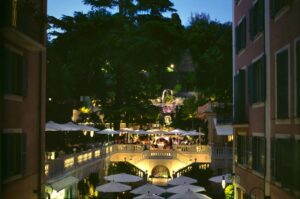
To look at Italy politically there is a sense that it has fallen on hard times, with debt levels not far off Greece’s, and significant poverty especially in the South, where a shadow economy may or may not be making life more supportable for young people, depending on which economist you speak to. I sometimes think that the beauty and the significance of Italy’s history somehow excuses it from doing anything in the crucial realm of the present. But I forgive it this as everything else: I’ve never been unaware in Italy that this is a country which has fallen on somewhat unhappy times since the time of Michelangelo; but then I’ve never minded much because I’m in the country of Michelangelo.
The Hotel de Russie is right under the Borghese Gardens, next to Piazza del Popolo. That makes it reasonably near the Spanish Steps and about a half hour walk from the Coliseum and the Forum ruins. It’s a hotel so good it makes you delay your sight-seeing a little – and that’s the case even in a city where you know you’re ridiculously up against the clock on a long weekend, since there is more to see here than can be seen in a lifetime.
The Hotel de Russie’s Secret Garden sweeps upwards in attractive tiers, almost as far as the Borghese. It is a place of white climbing roses, yews and palm trees. Water fountains trickle on each tier, meaning that breakfast is a calm affair. Several years ago, they used to serve delicious honeycomb as part of the buffet, but that has now been jettisoned due to the pandemic, a sad legacy.
The hotel has a star-studded history. It was here that Pablo Picasso and Jean Cocteau stayed when collaborating on Palade, the first of the so-called Ballets Ruses, a production which counts as the first Cubist ballet. The hotel is justifiably proud of this heritage, and has a Stravinsky bar, and a Picasso suite. On the top floor there is a vast apartment with a sauna in it where the cast of Ocean’s 11 reportedly stayed.
On our first day, exhausted by EasyJet’s tendency to demand farmers’ hours of its clientele, we were jolted into wakefulness by the magnificence of the Coliseum. Vaccine passports were on use in that attraction – and in all the others we went to – and seemed to work well.
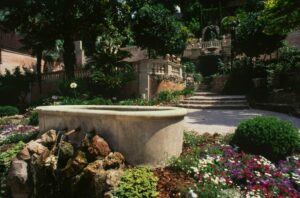
Inside, you feel dwarfed by the scale and ambition of what you find, and overwhelmed by the evidence of a civilisation with more intellectual force than ours. It is a strange thing that our society for all its ingeniousness seems to lack some quality which theirs had. Perhaps the Roman confidence can only come once to a species, but that doesn’t mean we can’t learn from it, and enjoy a touch of nostalgia along the way. Of course, in the process we must be careful not to turn a blind eye to the brutality of gladiatorial combat and slavery. But the fact remains: there is something about being in Rome which makes you want to do something big with your life, and why not begin that today?
The ruins of the forum will forever remain one of the sites of the world, especially at sundown, when they are filled with a melancholy light which knows all about the rise and fall of civilisations. It is futile, by the way, to search here for the place of Julius Caesar’s assassination since that took place around a half kilometre away in the Largo di Torre Argentina.
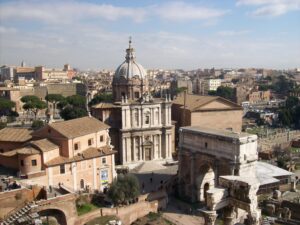
What are we searching for among these ruins? It seems to relate to some lack in ourselves which is betrayed by our glass architecture, our world of consumption, our frenetic pace. It is said by John Buchan that the peoples of the past were all storm and sunshine – that is they lived next to the bad in life and so experienced a heightened sense of the good. Anyone who even glances at the Pantheon knows that it may as well have been created by aliens: nobody alive, and least of all our modern architects, seems to know how to do this.
If Rome makes us feel as though we have become somehow pale, then this is the case too when we compare ourselves to the Renaissance. Rome isn’t necessarily the best place to understand the Renaissance, partly because Raphael and Michelangelo dominated all the commissions. Besides, much of what they did is squirrelled away in the Vatican, either in rooms the public can’t access, or in places the public accesses too much. Even the Sistine Chapel feels like the expression of one man’s slightly cantankerous achievement.
Instead, to understand the Renaissance in its breadth and depth, you have to go to Florence, and fortunately the Rocco Forte chain have created the excellent Hotel Savoy there, this time just off the Piazza del Repubblica.
The suites here have been enlarged and the number of them reduced since I was last here in 2017, meaning that the customer has a roomier experience. The Presidential Suite in particular is one of the finest hotel rooms in the world with excellent views of Brunelleschi’s Duomo and Giotto’s Campanile.
Giotto didn’t live to see his bell-tower completed, but Italy is a reminder that the work we do, if it’s any good, will be taken on by others. The Renaissance is a relay-race: we think of it as a time of great individuals when really it was a team effort. This is perhaps best encapsulated by a young Leonardo da Vinci’s role in raising the great gold ball on a pulley system to cap Brunelleschi’s lantern on the cathedral. Years later, whenever he needed to summon up courage for the next big task he would recall that day: it’s for others to show us what is possible, and for us to enact that on our own terms.
Italy asks that we summon up courage in our own lives. By hosting both the Roman Empire and the Renaissance it reminds us that a country can be great more than once – and it does so even in its present condition when so much else has atrophied.
The great joy of Florence is in its churches. It is vital not to miss Donatello’s pulpits in San Lorenzo, and while you’re there not to forget to see the Laurentian Library whose steps were designed by Michelangelo. Tourists should also know that these are on separate tickets and by separate entrances, and not always open on the same day. If you go to Santa Croce make sure to visit the Pazzi chapel and its adjoining courtyard: they are places of rare peace and tranquillity.
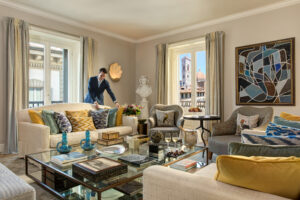
The city has suffered during Covid, as is to be expected when the country bore the brunt of the earliest part of the pandemic in Europe. In particular, a favourite restaurant Il Menagere had not yet reopened when we were there. Meanwhile, the Orsanmichele was permanently closed when we were there at the end of 2021 and still operates reduced opening hours at time of publication.
But world historical cities like Florence have in-built resilience which stems from their perennial desirability. Boccaccio begins his book The Decameron with a description of the Black Death and how it affected his contemporaries. You can still visit today the Santa Maria Novella where that scene is set, and I hope people will still be able to do so hundreds of years from now.
Inside the church you can see Giotto’s Crucifixion, and Masaccio’s Trinity which more or less single-handedly started a revolution in art which still governs the way we see today. When the Black Death came, few would have imagined that the world was on the cusp of two hundred years of unprecedented achievement across every area of human endeavour.
Perhaps this is ultimately what Italy has to say to us now: that any civilisation worth its salt is in it for the long haul. And although the Rocco Forte chain has had a difficult pandemic, one senses that these magnificent hotels will bounce back also. The good things in life always do because ultimately that’s what people want.